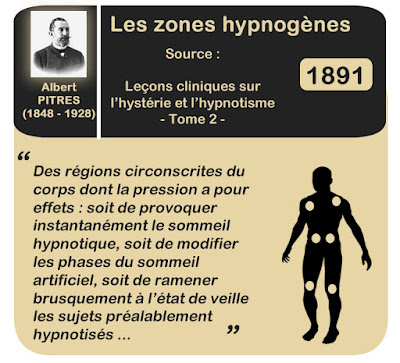La force motrice de la suggestion...
La théorie la plus couramment avancée (appelée par McDougall la théorie «idéo-motrice») soutient que la suggestion de l'opérateur suscite, par réaction, une «idée» chez le sujet. Cette "idée" (qui est une représentation de l'état attendu par le sujet), renforcé par toute émotion organisée en son sein en tant que sentiment, possède en soi une force motrice suffisante pour provoquer la dissociation (et l'intégration?) et, par conséquent, les phénomènes correspondant à la représentation dans la conscience du sujet.
McDougall rejette cette théorie au motif que ce qu'on appelle «Idées» n’ont pas de force motrice propre, mais tirent leur impulsions uniquement en se liant à un ou plusieurs instincts émotionnels. Il propose donc ce qui est vraiment un corollaire nécessaire et une application de sa théorie de la nature des instincts et du rôle qu'ils jouent dans le comportement mental. Son explication de la suggestion et du rapport exige donc un examen attentif.
Pour apprécier le sens de sa théorie, il faut garder à l’esprit que, selon lui, les «idées», comme on les appelle, sont en elles-mêmes des choses inertes, incapables de se mener à terme. Pour devenir efficaces, elles doivent s'associer à un ou plusieurs instincts émotionnels (peur, colère, curiosité, etc.). La pulsion, l'envie, l'impulsion ou le besoin impérieux de ces instincts fournissent la force motrice qui permet à l'idée de pouvoir être menée à son terme conformément au but de l'instinct.
Parmi ses instincts, il y a celui de la soumission ou de l'abandon de soi. C’est cet instinct, à ses yeux, qui est toujours réveillé par l’hypnotiseur et, de ce fait, lié à l’idée suggérée, et qui donne à la suggestion la force qui induit la dissociation de la personnalité et crée le rapport de soumission du sujet à l'hypnotiseur, entre autres.
La raison de l'éveil de cet instinct particulier se trouve dans l'attitude mentale du sujet envers l'hypnotiseur. Il regarde ce dernier comme un être au pouvoir supérieur auquel il confère un prestige, de l'autorité et un savoir et donc envers lequel il se sent inférieur. En fait, cet instinct est à la base du sentiment d’infériorité - le soi-disant «complexe d’infériorité». Je suis prêt à accepter le fait qu’il existe un tel instinct avec une «pulsion», même s'il n'est pas de nature de celle attribuée par McDougall, qu’il s’éveille dans de nombreux cas de suggestion hypnotique, et qu'il fournit alors la force motrice principale à la suggestion, ou au moins coopère grâce à cela.
-------- Texte Original -----------------
The most commonly advanced theory (called by McDougall the “ideo-motor” theory) holds that the suggestion of the operator awakens as a reaction an “idea” in the subject. This “idea” (which is a representation of the state expected by the subject), reinforced by any emotion organized within it as a sentiment has in itself an adequate driving force to bring about dissociation (and integration?) and, therefore, the phenomena corresponding to the representation in the consciousness of the subject.
McDougall rejects this theory on the ground that so-called “ideas” have no motive force of their own, but derive their impulses solely from becoming linked up with one or more emotional instincts. He proposes, accordingly, what is really a necessary corollary to and application of his theory of the nature of instincts and the purposive part they play in mental behavior. His explanation of suggestion and rapport therefore demands careful examination.
To appreciate the full meaning of his theory, it must be borne in mind that, according to him, “ideas,” so-called, are of themselves lifeless, inert things, incapable of carrying themselves to fruition. To become effective, they must become linked up with one or more of the emotional instincts (fear, anger, curiosity, etc.). The drive, urge, impulse, or craving of these instincts provides the driving force that renders the idea capable of being carried to fulfillment in accordance with the aim of the instinct. Among his instincts is that of submission or selfabasement. It is this instinct, in his view, that is always awakened by the hypnotizer and, thereby becoming linked with the suggested idea, gives the suggestion the force which induces the dissociation of the personality, on the one hand, and creates the submissive rapport of the subject with the hypnotizer, on the other.
The reason for the awakening of this particular instinct is to be found in the attitude of mind of the subject toward the hypnotizer. He looks up to the latter as a being of superior power whom he endows with prestige, authority and knowledge and therefore to whom he feels inferior. In fact, this instinct is the basis of the feeling of inferiority—the so-called “inferiority complex.” I am ready to accept the facts that there is such an instinct with a “drive,” even if not of the purposive nature attributed to it by McDougall, that it is awakened in many cases of hypnotic suggestion, and that it then provides the main driving force to the suggestion, or at least cooperates in doing this.






